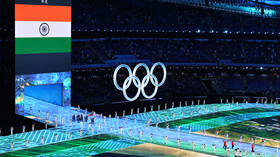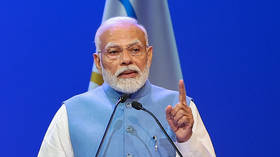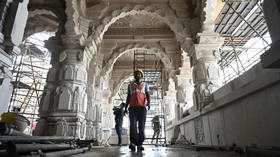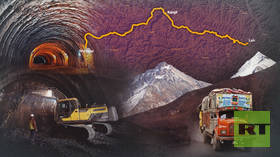Olympics 2036: Is India ready to take the leap?

It’s a global coming-of-age that most nations only dream of. India’s audacious bid for the 2036 summer Olympics underscores that she has shed the diffidence that marked her earlier forays on to the world stage with this new, big, bold and shiny ambition.
Those with Olympic starlight in their eyes and are part of Team India for the Olympics include Prime Minister Narendra Modi, who sees the value of mega-global events such as the recently concluded and successful G20 summit presided by India, and Mukesh Ambani and wife Nita Ambani.
Mukesh has a net worth of $88 billion. Nita is the first Indian woman to become a member of the International Olympic Committee (IOC) in 2016. She has a passion for sport and owns the Mumbai Indians team in cricket’s Indian Premier League.
The Olympic bid became public forty years (to the month) after an IOC session was held in Mumbai, where IOC President Thomas Bach said he would welcome a bid by India and was keen to include cricket, the Indian sporting passion, as one of sports. Clearly Nita’s passionate advocacy of cricket finally found a willing ear.
Hosting the Olympics has always been a beacon of unity for the host country but for India, with its ramshackle infrastructure, is it a leap too soon?
India is, at 1.432 billion, the world’s most populous nation, and has long been a cauldron of diverse cultures, traditions, and histories. As the world turns its gaze towards India’s potential to host the 2036 Olympics, the promise and challenges of such an endeavor are evident.
A multi-city approach is the new IOC priority and would do wonders for India as basic infrastructure would see substantial investment, creating many jobs as upgrades happen. At a time when fragmentation threatens India’s fabric, the Olympics could serve as a unifying force. The new Olympic guidelines permitting multi-city bids align perfectly with India's vastness.
Imagine track and field events in the bustling streets of Mumbai, aquatic events in the serene backwaters of the southern state of Kerala, archery in the historic city of Jhansi, in the country’s most populous state of Uttar Pradesh, and hockey, India's national game, in the heartland of Odisha state.
Such a decentralized approach would not only spread the economic benefits but also truly make it a ‘People's Games’. While the allure of hosting the Olympics is undeniable, India must tread cautiously. The Games cannot be a mere transaction between corporations and the government. The essence of the Olympics lies in their inclusivity. Every stakeholder, from the local vendor to the elite athlete, must feel a sense of ownership and pride. The danger of the event becoming a sweetheart deal, benefiting only a select few, is real and must be actively guarded against.
The governance of sport in India leaves much to be desired, with figures like Member of Parliament Brij Bhushan Saran Singh, the erstwhile chief of the Wrestling Association, who has been accused of alleged serial sexual harassment by medal-winning women wrestlers.
This underscores the need for professionalism. Does India possess the expertise to navigate the intricacies of hosting such a colossal event? With the current state of the Indian Olympic Association and national federations, skepticism is unavoidable.
The commendable performance at the Asian Games is a start, but can this success translate to the Olympic stage? Could the Youth Olympics be a stepping stone? Before diving into the deep end, should India not first test the waters by hosting the Youth Olympics?
Such an event would necessitate investment in young athletes, laying the foundation for future champions. It would also provide invaluable experience in organizing a global sporting event, albeit on a smaller scale.
The other issue is sustainability. We need to look at other cities that have successfully hosted the games, such as Sydney, London and Paris, which used the games to ensure an upgrade to the neglected parts of those huge cities.
Failure means that the ghost of white elephants – massive pieces of infrastructure that serve no post-event purpose – haunts every Olympic host city. India must look to the LA 2028 model, a paragon of professionalism, operating with the precision of a corporate entity. Sustainability should be at the heart of India's Olympic vision, ensuring that every facility has a clear post-Games purpose.
The dream of hosting the 2036 Olympics is tantalizing. It offers India an opportunity to showcase its rich heritage and modern dynamism on the world stage. However, the road is fraught with challenges. The question remains: Is India ready to take the leap, or would it be wiser to first strengthen its foundations?
Abhinav Bindra, the first Indian to win an individual gold medal at the Olympics (in shooting) and a member of IOC’s athletes’ committee, spoke to me at length in an interview. Bindra was present at the IOC’s Mumbai session (where India made its bid) and told me the story of what he had done in partnership with Naveen Patnaik, chief minister of the eastern Indian state of Odisha, for whom Bindra pulled no punches while expressing his deep appreciation.
Patnaik has emerged as a shining example of sport development, said Bindra, citing the slogan ‘Youth for Sports, Youth for Future’, encapsulating the CM’s commitment to harnessing the power of sport for the betterment of the state and its youth.
He said through strategic partnerships with the corporate sector Odisha has established cutting-edge high-performance centers, providing athletes with world-class training facilities. Notably, the state sponsors the national hockey team and has successfully hosted prestigious events like the Hockey World Cup, putting India on the global sport map.
“What sets Naveen Patnaik's leadership apart is his dedication to taking sport to the grassroots level,” Bindra said. “The Olympic Values Education Program, currently piloted in 250 schools, has introduced 15,000 girls to sport, simultaneously boosting attendance rates and school enrollments. His vision extends beyond sport, with initiatives like the Odisha Ridley Forest project, a part of the Olympic Forest Network, demonstrating his commitment to sustainability and positive change. Under his guidance, Odisha is using the power of sport to pave the way for a brighter, more inclusive, and environmentally conscious future.”
He added that this would be news for most readers as the mainstream media ignores Olympic sports while focusing on cricket. The media needs to do a lot more to promote Olympic sports, he said.
Nita Ambani’s role in getting the Olympic bid through Bindra was clear. “Nita Ambani has a passion for sports and her ability to forge meaningful connections within the international sports community have undeniably played a pivotal role in enhancing India's standing within the IOC,” he said.
Bindra said that through his years in the IOC as a Commission member, Bach provided unwavering encouragement and support for India's development within the Olympic movement. “For him India has consistently been a top priority,” he said. If the bid happens and cricket is played in the India Olympics then it will be a dream come true for a billion people.
And, it will tell the world that India has arrived much like China did when it held a coming-out party by hosting the 2008 Olympics.
The statements, views and opinions expressed in this column are solely those of the author and do not necessarily represent those of RT.
















